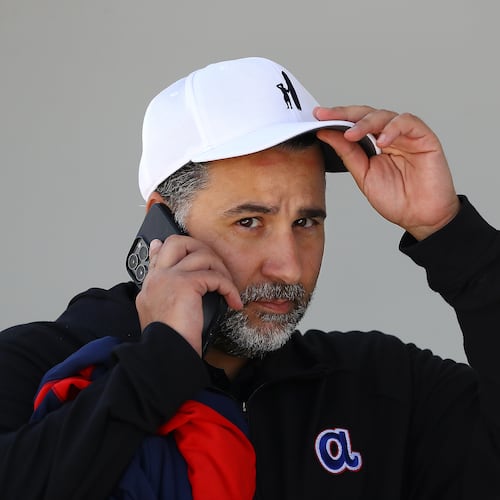The Braves were blessed with a mostly clean bill of health over a season-and-a-half span, helping them win the division in 2018 and build a sizable division advantage in 2019. That fortune has now shifted the other direction.
Shortstop Dansby Swanson, who's beginning to play rehab games, has been out because of a heel injury that came when he nicked his foot on a base. Nick Markakis, the franchise's ironman, won't return until mid-September thanks to a fractured wrist.
Also beginning a rehab assignment is Austin Riley, whose partially torn LCL turned out to be the best news for which the team could've hoped. Ender Inciarte is on his second lengthy stint on the injured list, this one because of a hamstring. And catcher Brian McCann, who's provided everything the Braves wanted in his homecoming, is out for a couple of weeks with a bothersome knee.
OK, now that we’ve run through their deeper IL list, let’s give props. The Braves have handled the injuries as well as any franchise could (except perhaps the Yankees, who’ve managed to lead the American League the entire season despite perpetually working short-handed).
Give credit to Matt Joyce and Rafael Ortega, neither of whom was expected to contribute to this degree (in Ortega’s case, you could argue at all). I consider their performances thus far a salute to the Braves’ culture and environment, which we’ve seen extract the best out of players usually viewed as subpar. If Ortega achieves nothing else in his time as a Brave, he’ll be remembered for his game-winning grand slam against the mighty Dodgers.
Adeiny Hechavarria was a shrewd pickup by the front office. Let's be honest: If Johan Camargo was playing up to expectations, the team wouldn't have had reason to sign Hechavarria. Camargo was a colossal disappointment, and after hitting a new low with his botched potential double play against the Mets, mandated the Braves look elsewhere. It was timely that Hechavarria, a former Blue Jays prospect under then-general manager Alex Anthopoulos, came available.
I'm not going to go overboard praising the Billy Hamilton move. It's the epitome of "fine." The Braves needed more outfield depth, and Hamilton is an upgrade on Lane Adams, who's a candidate for September promotion and perhaps a postseason spot. I don't know if Hamilton will prove anything more than expanded-roster fodder, but I know there's more upside there than the team's in-house options.
Hamilton doesn’t add anything to the team’s offense. He does add another excellent defender, speed and athletic ability to a team already oozing with it, and another band-aid should the Braves suffer another outfield injury. He’ll cost the team a $1 million buyout after the season, a small price for additional depth.
Among the many differences between the Braves and Dodgers last October was the bench. The Dodgers had rich depth, a bench of players capable of starting elsewhere. The team has made a name for itself with the Max Muncy and Chris Taylor-type players of the world.
The Braves had third-catcher Rene Rivera and light-hitting infielder Ryan Flaherty on their bench. They also had the feast-or-famine Lucas Duda, who’s since returned to the organization after a hideous stint in Kansas City.
That isn’t to criticize those players, but their skill sets simply didn’t compare with the elite benches of baseball. These Braves are much more equipped for the postseason, having plentiful options to join Charlie Culberson on the reserve unit.
The injuries aren’t a blessing in disguise. That’s not where I’m going with this. The team would rather have Swanson dazzling at short than watch Camargo stumble over himself or bring in an outsider to start that night.
But their injury flurry has made one thing evident. Anthopoulos has assembled a significantly deeper team than last season.
Rather than scrambling to find players worthy of the postseason roster, the Braves will have ample selection. And on top of that, the plus-performance from numerous role players is a testament to the team’s clubhouse atmosphere. Whatever ingredient “it” is, the Braves have used it to create a clubhouse that brings out the most in its inhabitants.
That’s worth plenty of praise. The task now is to continue holding fort until the regulars return. If the Braves are mostly healthy come the postseason, they’ll be well-positioned for their first October series win in almost two decades.
About the Author
The Latest
Featured


